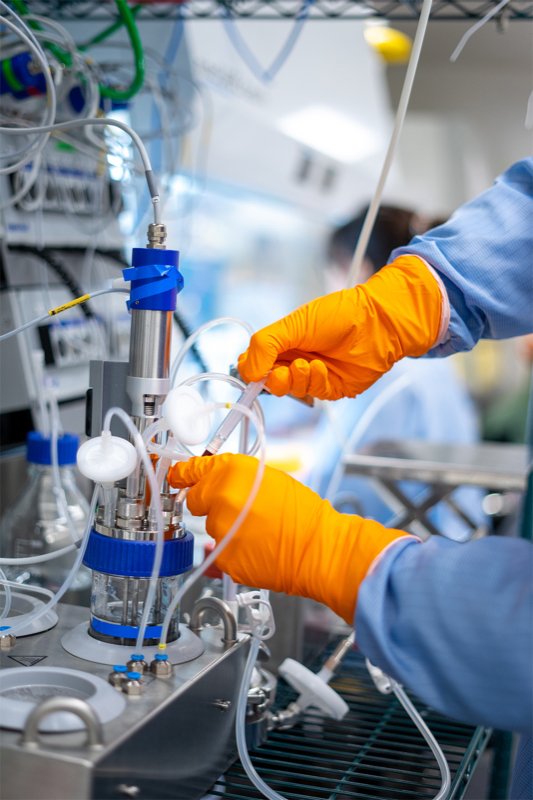The course comprises approximately 160 full-time study hours. The course content includes lectures with associated individual homework where the student reads and reviews relevant scientific articles, and summarizes the knowledge in the form of written assignments, and actively participates in discussions with other students.The course includes a project consisting of independently designing and presenting a strategy for animal cell culturing for the purpose of manufacturing a protein-based biological drug, which is communicated and examined in the form of a project report. The course also provides practical training in developing a cultivation process by the use of computer simulations, so-called virtual cultivation.
FCB3206 Mammalian Cell Technology 6.0 credits

The course provides knowledge and skills on the cultivation of mammalian cells and its application for the production of biological drugs (biopharmaceuticals).
Information per course offering
Course offerings are missing for current or upcoming semesters.
Course syllabus as PDF
Please note: all information from the Course syllabus is available on this page in an accessible format.
Course syllabus FCB3206 (Spring 2022–)Content and learning outcomes
Course disposition
Course contents
The course teaches theory and methodology in the field of cell technology applied to animal cells.
Theoretical concepts included
- basic techniques for animal cell culture in shake flasks and small-scale bioreactors
- description and use of stable expression systems (cell lines)
- overview of animal cell metabolism during cultivation, and its application in process design
- aspects concerning commercial production such as patient safety and regulatory compliance
- cells as products
- application of knowledge from the course to develop and design culture processes
The student also receives practical training in
- developing a process flow chart and strategy for cell culturing
- choosing an appropriate cell line and expression system
- developing a culture process for industrial application (scale-up constraints)
- understanding the concept of "Good Manufacturing Practice" (GMP)
- deciding on patient safety level and from that design a suitable process
Intended learning outcomes
Upon completion of the course, the course participant is expected to be able to
- demonstrate knowledge of key theoretical concepts and basic methodology regarding the cultivation process of animal cells, as well as skills in communicating, reviewing, analyzing, and discussing the course topics (ÖVN1)
- demonstrate the ability to use acquired knowledge to independently design, motivate and present strategies for animal cell culture process in order to manufacture a therapeutic biologics (PRO1)
- demonstrate a basic understanding of the possibilities and limitations of the application of animal cell-culture techniques for the development of therapeutic biologics, and reflect on their use in a sustainable and ethical perspective (PRO1)
Literature and preparations
Specific prerequisites
Eligible for studies at the third-cycle level.
Literature
Examination and completion
Grading scale
Examination
- PRO1 - Project, 4.0 credits, grading scale: P, F
- ÖVN1 - Exercises, 2.0 credits, grading scale: P, F
Based on recommendation from KTH’s coordinator for disabilities, the examiner will decide how to adapt an examination for students with documented disability.
The examiner may apply another examination format when re-examining individual students.
If the course is discontinued, students may request to be examined during the following two academic years.
Other information about the course and grade criteria are found in the course memo.
Examiner
Ethical approach
- All members of a group are responsible for the group's work.
- In any assessment, every student shall honestly disclose any help received and sources used.
- In an oral assessment, every student shall be able to present and answer questions about the entire assignment and solution.
Further information
Course room in Canvas
Offered by
Education cycle
Supplementary information
The course replaces FBB3650.
Additional regulations
Five students is the minimum number of participants for a course offering to be given.